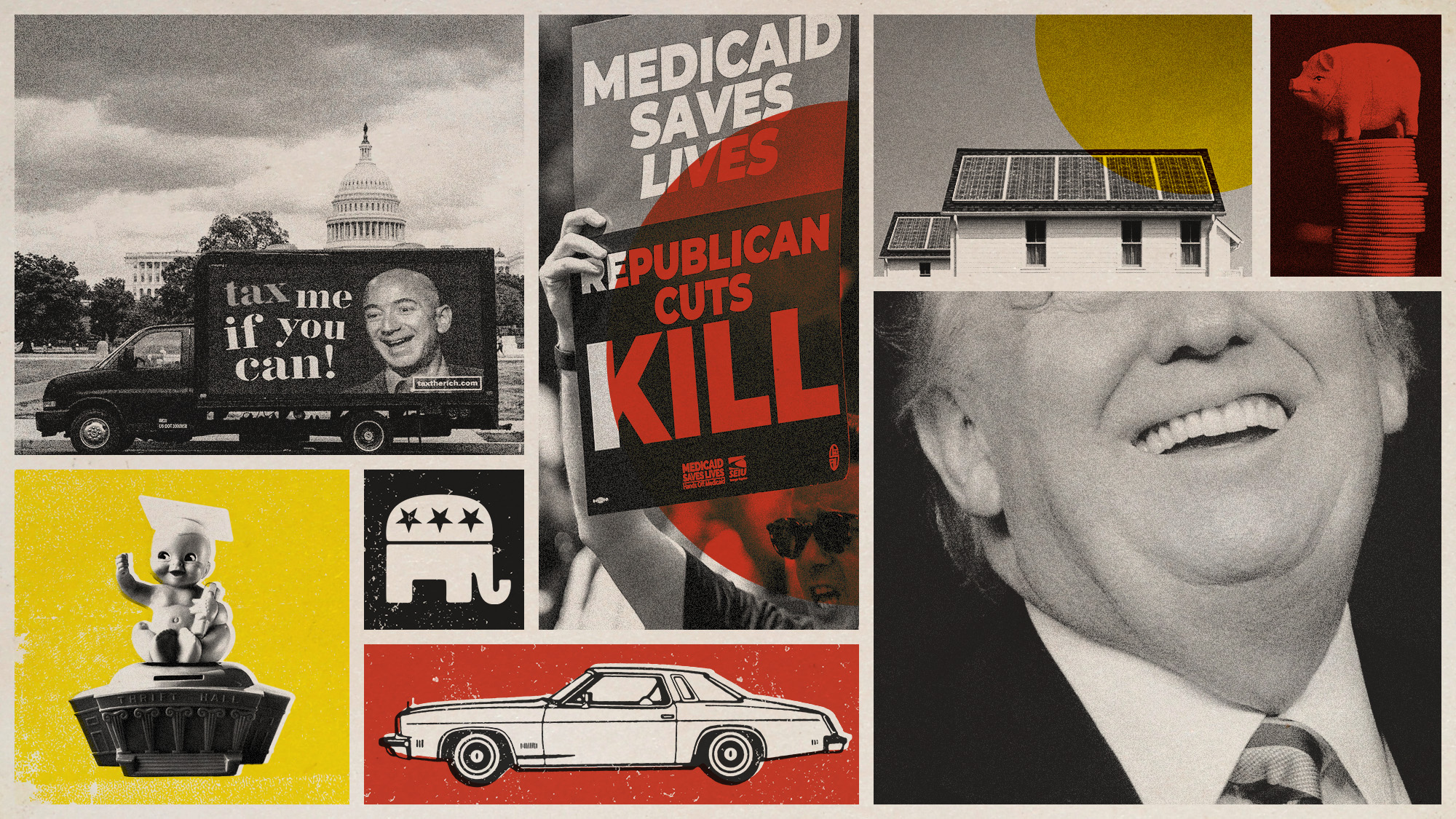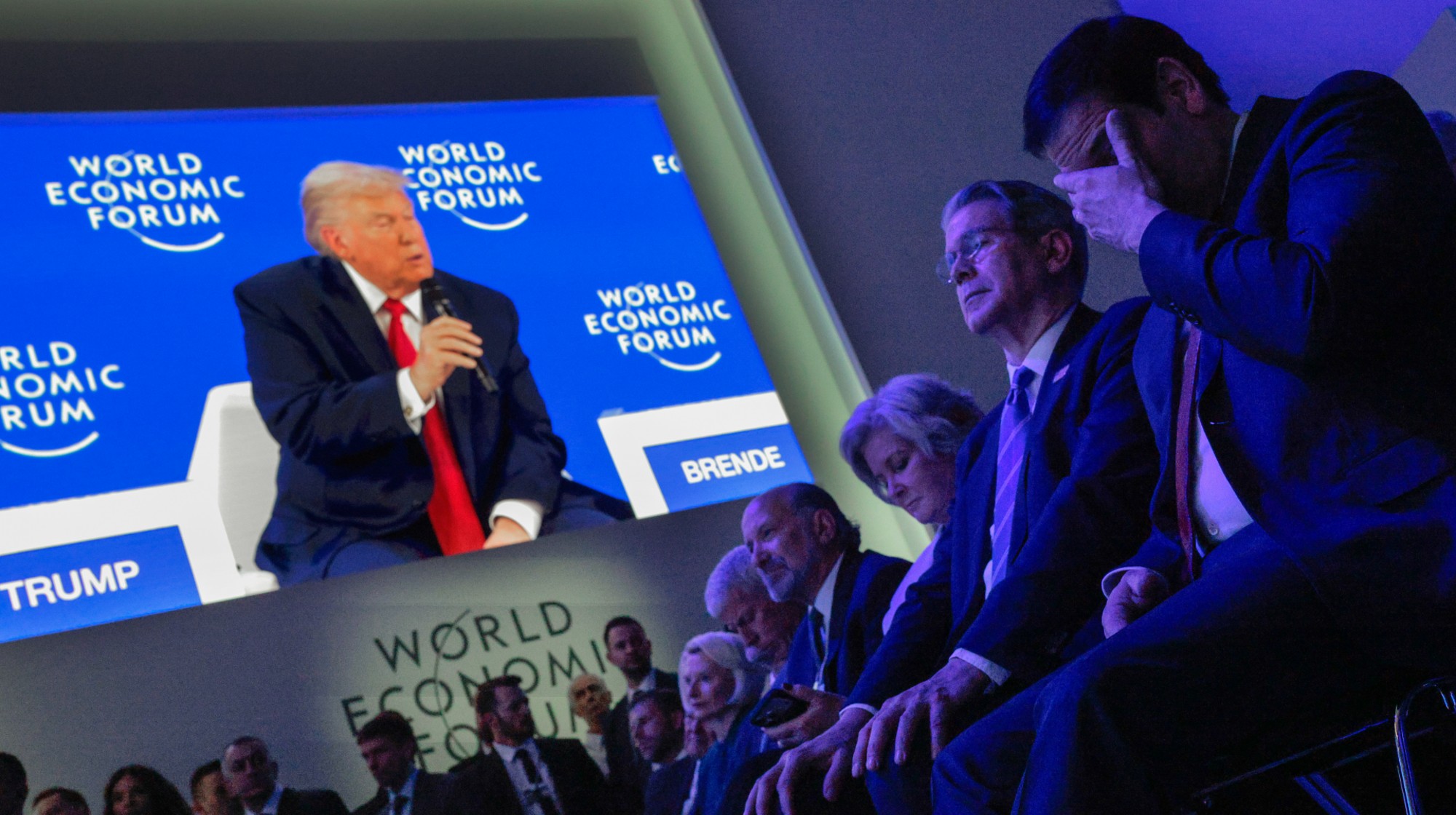What is in Trump's 'big, beautiful bill', and what difference will it make?
Controversial legislation has passed after 'gruelling' session on Capitol Hill

A free daily email with the biggest news stories of the day – and the best features from TheWeek.com
You are now subscribed
Your newsletter sign-up was successful
The US Congress has passed Donald Trump's tax and spending legislation after a tense session in Capitol Hill.
The president said his so-called "big, beautiful bill" would "turn this country into a rocket ship" but critics say it will leave millions without health coverage and benefit the wealthy at the cost of those on lower incomes.
How did it get passed?
Following a "gruelling" session yesterday, the House of Representatives passed the bill by a vote of 218 to 214 after it was approved in the Senate on Tuesday with a tie-breaker vote from Vice President J.D. Vance, said the BBC.
The Week
Escape your echo chamber. Get the facts behind the news, plus analysis from multiple perspectives.

Sign up for The Week's Free Newsletters
From our morning news briefing to a weekly Good News Newsletter, get the best of The Week delivered directly to your inbox.
From our morning news briefing to a weekly Good News Newsletter, get the best of The Week delivered directly to your inbox.
The advancement of the sprawling bill has not been easy, and it was passed only after "intense negotiations" and a "marathon voting session" on amendments, said Al Jazeera.
But a triumphant Trump is expected to sign it into law at a ceremony later today, with fighter jets poised to fly over the White House as he puts pen to paper.
What's in it?
It's a "smorgasbord of policy", said Vox, and focuses mainly on tax cuts, healthcare coverage, security measures and reductions in benefits to clean energy programmes.
During his first term, Trump signed legislation that lowered taxes for corporations and for individuals across most income brackets. Significant parts of that law are set to expire in December, but the new bill aims to make those tax cuts permanent. It also ushers in new tax cuts and expands the child tax credit, benefiting 40 million families.
A free daily email with the biggest news stories of the day – and the best features from TheWeek.com
Overall, the legislation contains about $4.5 trillion (£3.2 trillion) in tax cuts, and to help finance them there will be new restrictions and requirements for Medicaid, the healthcare programme relied upon by millions of disabled and low-income Americans. There will also be cuts to food programmes.
The bill sets aside about $350 billion (£256 billion) for Trump's border and national security plans, including $46 billion (£33 billion) for the US-Mexico border wall. And a tax break for people who buy new or used electric vehicles will now expire in September this year, instead of at the end of 2032 under the current law introduced by Joe Biden.
What difference will it make?
"For decades", said The Guardian, Republicans have said that the US would be "better off if taxes were low", and programmes to help those on low incomes were "harder to access". Now the country will "find out what it's like to live under that sort of system".
Wealthier taxpayers are expected to gain more from this bill than lower-income Americans, said Yale University's Budget Lab, which estimated that people in the lowest income bracket will see their incomes drop by 2.5%, mostly due to the changes to health and food programmes. The highest earners are expected to see their incomes rise by 2.4%.
According to estimates from the Congressional Budget Office (CBO), the bill could add $3.3 trillion (£2.4 trillion) to federal deficits over the next 10 years. The US government currently owes its lenders $36.2 trillion (£26.5 trillion). The CBO says the bill will leave millions without health coverage but the White House disputes this.
"Strategically", the bill is a "mammoth effort to consolidate the president's policy agenda and secure his legacy", said Sky News, but it has been "slammed" by "hawkish" Republicans and Trump's sometime backer Elon Musk because of its "boosts to government borrowing", said the Financial Times.
Chas Newkey-Burden has been part of The Week Digital team for more than a decade and a journalist for 25 years, starting out on the irreverent football weekly 90 Minutes, before moving to lifestyle magazines Loaded and Attitude. He was a columnist for The Big Issue and landed a world exclusive with David Beckham that became the weekly magazine’s bestselling issue. He now writes regularly for The Guardian, The Telegraph, The Independent, Metro, FourFourTwo and the i new site. He is also the author of a number of non-fiction books.
-
 The EU’s war on fast fashion
The EU’s war on fast fashionIn the Spotlight Bloc launches investigation into Shein over sale of weapons and ‘childlike’ sex dolls, alongside efforts to tax e-commerce giants and combat textile waste
-
 How to Get to Heaven from Belfast: a ‘highly entertaining ride’
How to Get to Heaven from Belfast: a ‘highly entertaining ride’The Week Recommends Mystery-comedy from the creator of Derry Girls should be ‘your new binge-watch’
-
 The 8 best TV shows of the 1960s
The 8 best TV shows of the 1960sThe standout shows of this decade take viewers from outer space to the Wild West
-
 Will increasing tensions with Iran boil over into war?
Will increasing tensions with Iran boil over into war?Today’s Big Question President Donald Trump has recently been threatening the country
-
 Corruption: The spy sheikh and the president
Corruption: The spy sheikh and the presidentFeature Trump is at the center of another scandal
-
 Rubio boosts Orbán ahead of Hungary election
Rubio boosts Orbán ahead of Hungary electionSpeed Read Far-right nationalist Prime Minister Viktor Orbán is facing a tough re-election fight after many years in power
-
 Greenland’s capital becomes ground zero for the country’s diplomatic straits
Greenland’s capital becomes ground zero for the country’s diplomatic straitsIN THE SPOTLIGHT A flurry of new consular activity in Nuuk shows how important Greenland has become to Europeans’ anxiety about American imperialism
-
 Which way will Trump go on Iran?
Which way will Trump go on Iran?Today’s Big Question Diplomatic talks set to be held in Turkey on Friday, but failure to reach an agreement could have ‘terrible’ global ramifications
-
 Grok in the crosshairs as EU launches deepfake porn probe
Grok in the crosshairs as EU launches deepfake porn probeIN THE SPOTLIGHT The European Union has officially begun investigating Elon Musk’s proprietary AI, as regulators zero in on Grok’s porn problem and its impact continent-wide
-
 Ukraine, US and Russia: do rare trilateral talks mean peace is possible?
Ukraine, US and Russia: do rare trilateral talks mean peace is possible?Rush to meet signals potential agreement but scepticism of Russian motives remain
-
 Trump backs off Greenland threats, declares ‘deal’
Trump backs off Greenland threats, declares ‘deal’Speed Read Trump and NATO have ‘formed the framework for a future deal,’ the president claimed